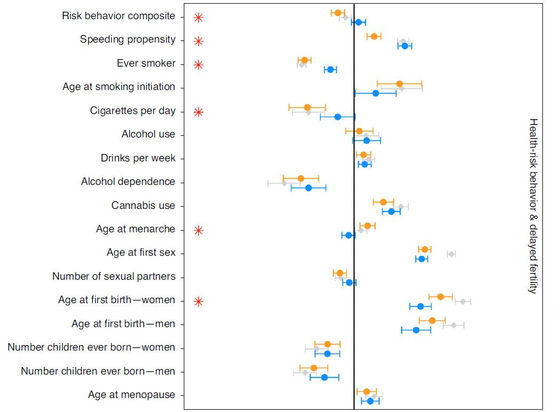Research results show that the effects on household income and drinking volume differ depending on IQ and propensity.

Intelligence quotient (IQ) is generally used to quantify human intelligence, but in recent years IQ has shed light on propensity because it does not take into account 'propensity to contribute to success' such as curiosity, self-control, and tenacity. Research to hit is also actively carried out. Joint research teams such as the University of Texas at Austin and the Amsterdam Institute of Public Health have revealed the results of a study on the effects of IQ and propensity (non-IQ) on household income and drinking.
Investigating the genetic architecture of noncognitive skills using GWAS-by-subtraction | Nature Genetics
Investigating the Genetic Architecture of Non-Cognitive Skills Using GWAS-by-Subtraction | by Paige Harden | Medium
https://medium.com/@kph3k/investigating-the-genetic-architecture-of-non-cognitive-skills-using-gwas-by-subtraction-b8743773ce44
What happens if you split the genetic effects on educational attainment into an IQ and non-IQ part?
— Abdel Abdellaoui (@dr_appie) January 7, 2021
Check it out in our new paper led by @PerlineDemange , @MarghMalanchini , @Danbelsky , @ kph3k , and @michelnivard out now in @NatureGenet : https://t.co/TOUXGNtuvE pic.twitter.com/2KCoCgG82l
The research conducted by the joint research team is a study of the correlation that exists between human propensity calculated from genetic data obtained by genome-wide association study and various data such as household income, alcohol consumption, and psychosis incidence. is.
Below are the correlation coefficients between each concept investigated by the research team and IQ / non-IQ. The correlation coefficient is a concept that expresses the relationship between two data by the strength from -1 to 1, and as it approaches -1, it becomes a relationship that 'when one increases, the other decreases', and approaches 1. The relationship is that 'when one increases, the other also increases'. The correlation coefficient between each concept and non-IQ is plotted in yellow dots, and the correlation coefficient with IQ is plotted in blue dots.

For example, 'Household income' has a correlation coefficient of about 0.7 with both IQ and non-IQ. This means that household income has a strong relationship with both IQ and non-IQ. In addition to household income, the two categories that belong to the

There are two decision categories: 'General risk tolerance' and '

In terms of health, 'Risk behavior composite' is almost unrelated to IQ and non-IQ, but 'Speeding propensity' has a slight correlation with IQ. Higher. 'Ever smoker', 'Age at smoking initiation' and 'Cigeratte per day' can be seen to be more closely associated with non-IQ, but 'Alcohol use' (Whether or not you drink normally) '' Drinks per week (drinking amount per week) 'is almost unrelated to both IQ and non-IQ. Regarding alcohol, it is noteworthy that only 'Alcohol dependence' has a negative correlation with IQ / non-IQ. Other than that, 'Cannabis use', 'Age at menarche', 'Age at first sex', 'Nyumber of sexual partners' 'Age at first birth-woman (age when having the first child, for women)' 'Age at first birth-man (age when having the first child, for men)' 'Number children ever born' -woman (number of children, for women) '' Number children ever born-man (number of children, for men) '' Age at menopause (age at menopause) '. The higher IQ / non-IQ, the later the age of having the first child.

In personality relationships, 'Openness (tolerance)', 'Conscientiousness ( integrity , the height of the self-control force)', 'Extraversion (extrovert)', 'Agreeableness (cooperation),' 'Neuroticism (neurotic tendencies)' and the like. Compared to IQ, non-IQ, which is a numerical value that indicates mental goodness, is strongly related to these elements of personality relationships.

Similarly, 'Schizophrenia', 'Bipolar disorder', 'Obsessive-compulsive disorder', 'Anorexia nervosa', 'Attention deficit hyperactivity disorder' Mental disorders such as 'sexual disorder: ADHD', 'Major depressive disorder', and 'Autism spectrum disorder' include schizophrenia, bipolar disorder, obsessive-compulsive disorder, and anorexia. Tends to have a stronger correlation with non-IQ, while depression / autism spectrum disorders tend to have a stronger correlation with IQ.

Related Posts:
in Science, Posted by darkhorse_log







